Marcos Highlights the Importance of Collaboration
President Ferdinand Marcos Jr. on Monday called on business executives from the Philippines and Cambodia to deepen cooperation in key sectors. Speaking at the CEO B2B Networking Roundtable in Phnom Penh, he stressed the value of building on growing economic relations to support modernization and sustainable growth.
The gathering was part of his three-day state visit, designed to highlight regional partnerships. Marcos emphasized that stronger ties between the two nations would not only enhance trade but also create new opportunities for investment and innovation.
Expanding Beyond Traditional Industries
According to Marcos, the Philippines-Cambodia relationship should move past conventional economic areas. He underscored that future development lies in both established and emerging sectors. Industries like consumer goods, healthcare, education, and franchising were singled out as crucial in shaping modernization.
He also noted that expanding into logistics, infrastructure, and agro-processing could unlock growth potential. These fields, Marcos said, align with both countries’ development strategies while matching broader global trends in innovation and sustainability.
Signed Agreements to Boost Cooperation
Marcos announced that the Philippines and Cambodia had already signed agreements covering transnational security, higher education, and air services. These accords aim to build stronger institutional frameworks that will enable businesses to thrive.
The president described these deals as early steps that could pave the way for deeper collaboration. By enhancing connectivity, ensuring security, and promoting academic exchanges, both countries can lay the groundwork for long-term economic progress.
Recommended Article: Australia Small Businesses Caught in US-China Trade War
Emphasis on Digital and Sustainable Growth
Marcos framed digital transformation and sustainability as central to future cooperation. He pointed out that global trends increasingly demand innovation-driven and eco-friendly solutions, areas where both nations can work together effectively.
By fostering joint ventures in technology and green industries, he argued that businesses can not only capture market growth but also respond to pressing environmental and social challenges. This reflects his administration’s broader commitment to inclusive and resilient economic policies.
The Role of Private Sector Leaders
The president emphasized that the success of bilateral cooperation depends heavily on private sector leadership. Business executives, he said, must take the initiative to explore opportunities and build partnerships across borders.
He added that government can provide the enabling environment, but it is enterprises that will drive trade, investment, and innovation forward. Marcos expressed confidence that Philippine and Cambodian business leaders have the capacity to strengthen ties in ways that benefit both nations.
Opportunities in Key Sectors
Among the sectors identified, consumer goods and healthcare were presented as immediate growth opportunities. Rising demand in both countries creates strong potential for mutual trade expansion. Education was also highlighted, with calls for deeper collaboration between universities and training centers.
Infrastructure and logistics were described as long-term enablers of growth, with both governments urged to work with private investors in building efficient transport and supply chain systems. Agro-processing, meanwhile, was identified as an area that can directly support rural communities and food security.
Building a Shared Economic Future
In conclusion, Marcos said that strengthening business ties is vital for shaping a shared future of economic resilience. He emphasized that collaboration across traditional and emerging industries will help the Philippines and Cambodia meet development challenges together.
The president’s state visit underscores his administration’s strategy of deepening ASEAN partnerships, which he views as central to regional stability and prosperity. By fostering stronger business networks, he aims to ensure that Philippine companies remain active players in the fast-growing Southeast Asian economy.















